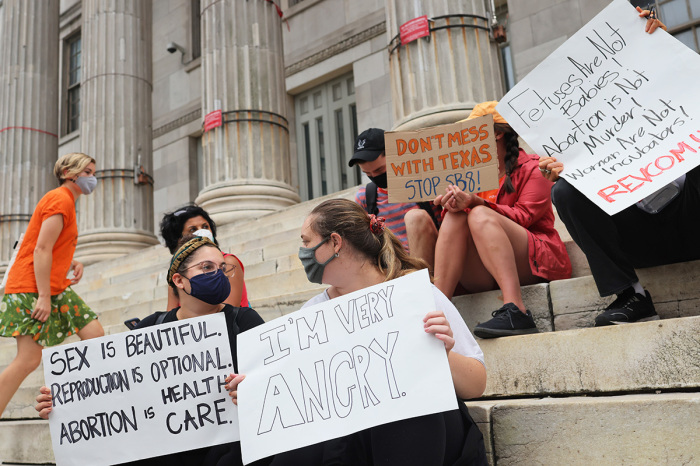Biden Justice Dept. calls Texas abortion law ‘scheme of vigilante justice’ in push to block it

Calling it an "unprecedented scheme of vigilante justice," an attorney for the U.S. Justice Department asked a federal judge on Friday to block Texas' controversial Senate Bill 8 law, which prohibits abortions once a fetal heartbeat can be detected.
"A state may not ban abortions at six weeks," Justice Department attorney Brian Netter told U.S. District Judge Robert Pitman in a hearing Friday, according to The Associated Press.
"Texas knew this, but it wanted a six-week ban anyway, so the state resorted to an unprecedented scheme of vigilante justice that was designed to scare abortion providers and others who might help women exercise their constitutional rights."
Texas' S.B. 8 was signed into law in May and enacted on Sept. 1 after the U.S. Supreme Court refused to grant an emergency injunction to block the legislation from taking effect.
In addition to banning most abortions after six weeks of gestation, S.B. 8 also allows private citizens to take civil action against anyone who "performs and induces an abortion" or "knowingly engages in conduct that aids or abets the performance or inducement of an abortion, including paying for or reimbursing the costs of abortion through insurance or otherwise."
If successful in their lawsuits, private citizens are entitled to at least $10,000 in damages.
Last month, the Justice Department filed an emergency motion seeking a temporary restraining order or preliminary injunction against S.B. 8, arguing that the law violates Supreme Court precedent dictating that there is a constitutional right to abortion.
"When other States have enacted laws abridging reproductive rights to the extent that S.B. 8 does, courts have enjoined enforcement of the laws before they could take effect. In an effort to avoid that result, Texas devised an unprecedented scheme that seeks to deny women and providers the ability to challenge S.B. 8 in federal court. This attempt to shield a plainly unconstitutional law from review cannot stand," lawyers for the federal government argued in their motion.
"The United States has a strong and legitimate interest in ensuring that states respect their obligations under the Constitution, and in fulfilling the United States' responsibilities under Federal law. If Texas's attempt to nullify the Constitution of the United States prevails, it may become a model for action in other areas, by other states, and with respect to other constitutional rights and judicial precedents."
Oral arguments in the case were heard Friday by Pittman, an Obama appointee, who held a three-hour hearing.
Attorney Will Thompson from the Texas Attorney General's Office maintained that the federal government's arguments were "hyperbole and inflammatory rhetoric," according to The Wall Street Journal. He also contended that the judge couldn't issue an injunction because there is no person the court could prohibit from enforcing the law.
In their motion asking for a dismissal of the federal government's case, attorneys for the Texas government argued that the legislation is lawful and the federal government lacks the power to sue Texas for the requested relief because the federal government has not shown how it has been irreparably harmed by the law. The state also argues that the injunction the federal government is seeking is too broad.
"The Court should deny the federal government's motion for a preliminary injunction and dismiss this case," Texas' attorneys noted.
"Article III does not permit courts to hear 'a proceeding against the government in its sovereign capacity' when 'the only judgment required is to settle the doubtful character of the legislation in question.'"
"The federal government asks the Court to dispense with the normal cause-of-action requirement based on unfounded fears that the Texas Heartbeat Act will otherwise 'evade judicial review,'" the state's motion continues. "Nothing could be further from the truth. The constitutionality of the Texas Heartbeat Act can be reviewed in the same way that virtually all of state tort law is: State-court defendants raise constitutional defenses before neutral judges sworn to follow the U.S. Constitution and, if necessary, appeal to the U.S. Supreme Court."
The state argues that the fact that "private parties may rely on the challenged statute in other litigation does not create a case or controversy against the sovereign."
"It simply shows that those other cases would be the proper cases for deciding the constitutionality of the challenged statute," the state's motion reads.
The U.S. Supreme Court begins a new term Monday, including arguments in a case to determine the legality of Mississippi's 15-week abortion ban. Some believe that the case could threaten the legal precedent on abortion set by the Supreme Court in the 1973 case of Roe v. Wade.



























